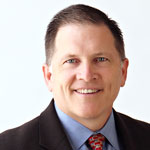
During some of the darkest days of the recession in 2008, Universal Services of America took a calculated risk. As banks were failing, businesses were closing, and millions of workers were being laid off, the company’s executives implemented an aggressive growth strategy of borrowing, spending, acquiring “culturally mirrored” companies, and hiring new employees. “We were betting the company’s future . . . and were scared to death,” says Universal’s CEO Steve Jones.
The bet paid off. Since 2008, the company has created more than 35,000 jobs—many of them for veterans—acquired thirty-six companies, and grown to become the largest regional security and janitorial services company in the United States. Today, the company employs 45,000 people in forty-seven states, Puerto Rico, and the US Virgin Islands; posts $1.3 billion in annual revenues; and continues to grow 35–40 percent every year.
What may appear to have been the company’s “sink or swim” response to a massive economic crisis is actually part of a long-term strategy that has produced double-digit annual growth since 1996. Those results have come about through a combination of both organic internal expansion and actively seeking opportunities to acquire appropriate assets.
“We run fast and smart—always looking for ways to expand and improve,” Jones says. That was certainly true of the expansion during the recession, which Jones viewed as a growth opportunity while other companies hunkered down into survival mode. Today, that approach remains the company’s driving force as Universal continues to mature, increases its service offerings, and extends its reach into new markets.
For example, most security providers focus exclusively on either personnel or technology services, assuming that one eliminates the need for the other (for example, having more video cameras reduces the need for additional guards). Universal, however, provides both. This enables the company to offer comprehensive security programs. “Instead of trying to sell more hours, we’re offering integrated solutions that improve service, save clients money, and reduce risk,” Jones says. In 2014, this approach brought in two multimillion dollar contracts for a national hospitality chain and a portfolio of commercial office buildings.
Universal has also launched an initiative to identify specialized vertical markets. Health care and national accounts with locations across multiple cities, states, and territories, for example, offer the unique challenges and requirements that will allow the company to leverage its experience and specialized expertise.
One of the keys to Universal’s success is being able to strike a balance between being responsive to market demands as well as anticipating customer needs. This was demonstrated in September 2001. As the country reeled from the terrorist attacks, Universal had to immediately revise officer training, develop new programs, and address customer fears that were suddenly on a scale that could not have been anticipated. “After 9/11, we came up with tabletop training for clients and our own employees so that everyone felt safe,” Jones recalls. “At a moment’s notice, we had to develop ways to make sure they understood the terror threats and how to respond.”
On the opposite end of the product-development spectrum, Universal stays heavily involved with its customer base in order to identify trends and opportunities. One such “eureka” moment occurred when the company recognized the connection between the thousands of passive, unmanned security cameras across the country and Thrive Intelligence, a state-of-the-art remote video-monitoring service. By acquiring Thrive, Universal created a new revenue stream by introducing the ability to convert those record-only cameras into actively monitored surveillance. Jones characterizes that offering as “a reasonably priced service” that grew 200 percent in 2014.
Jones is aware that the “run fast, run smart” mantra presents challenges to his staff and employees. In fact, he says, “As we keep growing, our biggest challenge isn’t strategy or financial constraints or the economy. It’s finding the people who fit our culture and see that being able to keep up at our pace as a badge of honor.” Once they join the team, Universal helps such employees guarantee success through Universal University, which provides training at all levels. In addition to staff development, part of the program’s mission is to make sure that instruction evolves to stay relevant with changing security requirements.
One intensified, specialty course of study is the three-month Universal Certified Security Program. Made up of forty to fifty short, demanding classes, only 10 percent of employees have completed it successfully. Those who do, however, are added to promotion and advancement lists, and are given the chance to use their newly acquired skills in the field and to grow into supervisory and corporate positions.
Like the company, Universal’s employees keep their eyes open for new opportunities to grow personally and professionally in an environment where expectations are constantly increasing and the bar is always moving higher. “It’s a tough pace, but our people find it tremendously rewarding, because they accomplish things they wouldn’t have accomplished anywhere else,” Jones says. “We really celebrate those accomplishments.”

